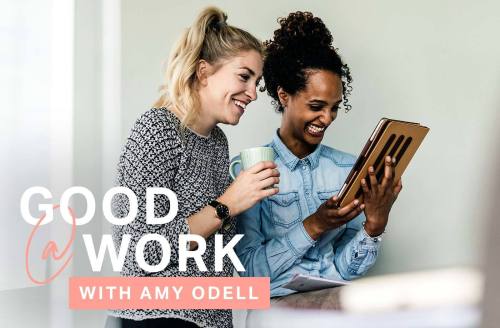Having friends at work is good; cliques at work are bad. But when you’re only inviting a select few of your coworkers to grab a drink after you clock out, it can feel impossible to avoid a Mean Girls situation. In this week’s Good@Work column, career expert Amy Odell—whom you may know as the former editor of Cosmopolitan.com and founding blogger of New York magazine’s The Cut—explains how to keep your water cooler banter from making the office feel like the high school cafeteria.
Question:
Is it possible to go to lunch—or get drinks or do anything after work—with just one or two coworkers without coming across as cliquey? I often feel like kindergarten-birthday-party etiquette of “invite the whole class” applies, but in this case, doing so can make hanging out socially feel like a business meeting.
Answer:
Jobs are hard. Jobs are emotionally taxing. This is why we need to make friends with colleagues, the people who understand the precise ways in which our souls are sucked from our hardening heart centers every time we step foot into the office and spend excruciating precious hours in meetings that could have been an email. (I know this sounds grim, but show me a person who has loved their job for four full years and I’ll show you a Whole Foods with soft toilet paper.) Going to drinks with work friends after work is simply necessary for survival. I’m not saying you need to spend the whole two hours you’re together complaining about work, but you shouldn’t feel guilty for doing just this. Research even shows that complaining might actually leave you energized, regenerating a tiny bit of the part of your soul that your job has vanquished. No offense to your other friends, but the only people who can truly understand your complaints are those who put up with the same army of idiots every day as you.
Also, work is the primary place adults make new friends after college. You shouldn’t avoid nurturing these friendships because you’re concerned about hurting someone else’s feelings. Though this is a kind and commendable instinct, avoiding private outings with work friends will probably hurt you more in the long run than it will benefit someone else emotionally in the short term.
Let me be clear: Friends aren’t bad; inside jokes aren’t bad. Acting immaturely as a result of those friendships and inside jokes is bad. Making a scene is bad.
That said, your concerns about office optics are reasonable. Friendships with work people can exist in the office and outside the office, but being seen as part of a clique doesn’t stand to do you any favors. It seems every office has an open floor plan now, with barely a piece of driftwood for employees to call their own and perch a laptop and a coaster, which means the nature of relationships with coworkers are painfully obvious to those around us. Work is not the place where you need to have loud discussions about your favorite LaCroix flavor and your wild Tuesday nights out. Everyone can probably imagine a pair or group of work friends who existed within a forcefield of obnoxiousness, keeling over in laughter around the communal sink because of an inside joke that just made everyone else roll their eyes.
Let me be clear: Friends aren’t bad; inside jokes aren’t bad. Acting immaturely as a result of those friendships and inside jokes is bad. Making a scene is bad. Managers notice these things, and they want to know that when you come to work, you’re there to work and behave professionally, not to socialize and gossip. You don’t want to give your boss doubts about sending you and your friend to the same client meeting because she thinks you might make eyes at each other across the table and burst into laughter. And managers notice more than you think they do. They can tell if you’re texting a friend in a meeting with eight other people. They notice if you walk out of the conference room and dissolve into laughter and eye rolls. They notice if you’re together all the time, and they will form a judgement about how that friendship affects both of you as workers, and the team dynamic on the whole.
So yes, you can have casual drinks with select people from your office. Work may be full of people with the personalities of toddlers, but it’s not a kindergarten birthday party. That said, when you are in business meetings with the same people you want to drink with on a random Tuesday, you need to act like you’re doing business, not trading gossip over Aperol spritzes.
 Amy Odell is a journalist and author living in New York. She is the former editor of Cosmopolitan.com, which became one of the most popular and award-winning sites for millennial women during her tenure. She is passionate about mentoring people starting off in their careers. She is from Austin, Texas.
Amy Odell is a journalist and author living in New York. She is the former editor of Cosmopolitan.com, which became one of the most popular and award-winning sites for millennial women during her tenure. She is passionate about mentoring people starting off in their careers. She is from Austin, Texas.
Follow her on Twitter, Instagram, Facebook, and sign up for her newsletter here.
Have a career question for Amy? Email us at goodwork@www.wellandgood.com.
More Good@Work:
Why ‘constructive criticism’ is a lie, according to a career expertMy boss is texting me on nights and weekends—how can I take back my time?How do I prep for my co-worker’s maternity leave without excluding her before she’s gone?
Sign Up for Our Daily Newsletter
Get all the latest in wellness, trends, food, fitness, beauty, and more delivered right to your inbox.
Got it, you've been added to our email list.











